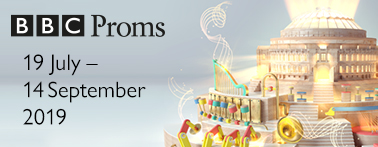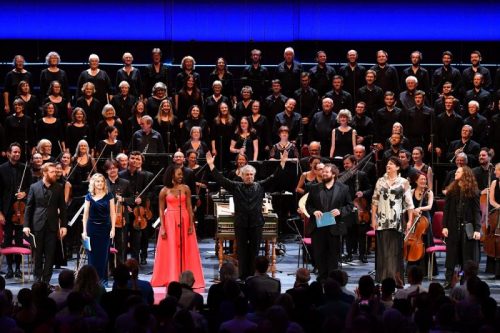
 United Kingdom BBC PROM 55 – Handel: Soloists, SCO Chorus, Scottish Chamber Orchestra / Richard Egarr (conductor). Royal Albert Hall, London, 30.8.2019. (CC)
United Kingdom BBC PROM 55 – Handel: Soloists, SCO Chorus, Scottish Chamber Orchestra / Richard Egarr (conductor). Royal Albert Hall, London, 30.8.2019. (CC)

Handel – Jephtha, HWV 70 (1751)
Cast:
Jephtha – Allan Clayton
Iphis – Jeanine De Bique
Storgé – Hilary Summers
Zebul – Cody Quattlebaum
Hamor – Tim Mead
Angel – Rowan Pierce
Composed to a libretto by the Reverend Thomas Morell based on the story of Jephtha from Judges and George Buchanan’s 1554 Jephtha or the Vow, Handel’s last oratorio was premiered at the Covent Garden Theatre in London in 1752. Like so much of the Old Testament, we meet a vengeful god who seems quite happy for Jephtha to vow to sacrifice the first (random) person he meets after going to war as long as he is victorious. Given that Jephtha does win the war, there’s a bit of a quandary to be dealt with as the first person he sees is actually his daughter, Iphis. Thankfully, an angel intervenes and all is (almost) well. Iphis has to remain a virgin, dedicating herself to this god. Harsh.
This performance of Jephtha is part of a BBC Proms multi-year cycle of Handel oratorios, launched by Israel in Egypt in 2017 and followed last year, on the penultimate night, by Theodora which I reviewed. Back in 2017 at St John’s Smith Square, Stephen Layton directed a fine performance of Jephtha that shared one soloist with this Proms account, the excellent Rowan Pierce, and which featured an outstanding contribution from Mary Bevan as Iphis. If anything, Egarr’s Jephtha was finer still, cast from strength and delivered with powerful dramaticism; it was very rare during the course of the evening that one wanted a touch more grit (an exception being Hamor’s air, ‘Up the dreadful steep ascending’).
The second act of Jephtha includes some of Handel’s most powerful music; drama that pulls no punches and is delivered with an immense imagination. And it was indeed in this act that Egarr’s performance reached its zenith, sustaining that momentum through to the work’s close. The sheer fragility of texture in Jephtha’s ‘O Zebul, Hamor …’ was remarkable, as was the desolation of Iphis’s ‘Happy they!’ with its perilously exposed unison voice and violins and the composer’s wilful withholding of the lower instruments, thus taking away the music’s foundation. Directing from an (uncredited) double-manual harpsichord, Egarr led a superbly nuanced slow opening to the Overture (it has no marking in Handel’s manuscript, although Grave would certainly be appropriate); the contrasting fast section was beautifully punchy. Egarr is an active director, often leaving his station at the harpsichord to stride towards a relevant section of the band. The piece was performed on modern instruments (valved trumpets, for example) but with historically-informed phrasing and the lightest of touches. And what a halo of sound the strings provided against Jephtha’s accompagnato, ‘If, Lord, sustain’d by thy almighty pow’r’.
The cast was a strong one. As Jephtha, Allan Clayton continued to impress after his excellent Narrator/Centurion in Berlioz’s L’enfance du Christ (Prom 37). Clayton’s purity of sound was one of the defining characteristics of his reading, as was a harmonic sensitivity (the intensity of ‘Dreads no event of fate’ in his aria ‘Virtue my soul shall embrace’) and fine agility (including expert vocal staccato). His true highlight came at the emotionally potent ‘Waft her, angels, through the skies’, a beautiful cantabile threading the vocal lines ever upwards.
Counter-tenor Tim Mead needs no introduction, and he offered well-nigh unparalleled excellence here. More, his voice blended with that of Trinidadian soprano Jeanine De Bique’s Iphis in the duet, ‘These labours past’; but the duet was almost upstaged by Mead’s stunning preceding recitative, ‘I go, my soul, inspir’d by thy command’. If De Bique’s voice seemed on occasion too small for the Royal Albert Hall (as in ‘Welcome, as the cheerful light’), she nevertheless has a great sense of Handelian style; she will perform Handel’s La Resurrezione for the Opéra Royale de Versailles next season, a space which I imagine will suit her much better.
American bass-baritone Cody Quattlebaum was a fabulous Zebul (Jephtha’s half-brother), full voiced and with words clearly audible. His voice has a lyricism at its heart that makes his every utterance enjoyable, and he has a keen grasp of dramatic shading. Hilary Summers found much depth to the character of Storgè. She also found much tenderness in her ‘In gentle murmurs’, helped by the dignified flute obbligato of Ahran Kim, and her ‘Scenes of horror’ was full of restrained dread (and blessed with seamless semiquavers to boot).
It’s always wonderful to experience Rowan Pierce in performance; mostly, she has appeared in Baroque music in concerts I have covered for Seen and Heard, although she shone too as Tiny in the ENO Paul Bunyan at Alexander Palace in May this year. Fresh-voiced, with a lovely free top, her ‘Rise, Jephtha, and ye rev’rend priests’ recitative was itself spellbinding; the air, ‘Happy, Iphis, shalt thou live’, crowned by the most exquisite flourish.
The Scottish Chamber Orchestra excelled itself, but maybe the real stars of the evening were the members of the SCO Chorus, perfectly disciplined throughout, at their most affecting perhaps in the Israelites’ remarkable ‘How dark, O Lord, are thy decrees’, the sorrowful homophonic lines against mournful dotted string rhythms. And of course, Handel would not be Handel with out a motley collection of fugues and imitative writing that revels in their own invention, and for this the SCO Chorus was up there with the best. It was only right that the chorus has the last word, Handel’s mastery of counterpoint heard at its brightest in ‘Ye house of Gilead, with one voice/Its blessings manifold rejoice!’, with its massively held ‘Ah …’ of the final ‘Amen’. A brilliant dramatic stroke to close a superb performance of one of Handel’s great masterworks.
Colin Clarke
